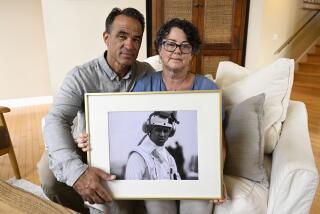U.S. Sailor in Japan Reportedly Suspect in Death
- Share via
TOKYO — The U.S. Navy is investigating whether an American sailor was involved in the slaying of a 56-year-old Japanese woman, police and diplomatic sources said Thursday, putting the spotlight once again on Japan’s uncomfortable relationship with the massive U.S. military presence on its soil.
Yoshie Sato was found dead shortly after 6:30 a.m. Tuesday near the entrance to a commercial building in Yokosuka, a port 43 miles south of Tokyo and home to the largest American naval base outside the U.S. She had been beaten and died of internal bleeding, according to Japanese police, who said her empty wallet found nearby suggested robbery was the motive.
Sato’s death has the potential to inflame feelings here against the approximately 47,000 U.S. troops stationed in Japan, along with about 14,000 sailors with the U.S. 7th Fleet who spend about half the year in port at Yokosuka. Tokyo is under intense domestic pressure to close -- or at least downsize and relocate -- U.S. bases, which are heavily subsidized by Japanese taxpayers and frequently cause friction in the communities that host them.
Simmering resentment at the noise and disruption caused by U.S. military exercises has boiled over in the past when American troops have been implicated in violent, high-profile crimes off base. Much of the friction has been on the distant southern island of Okinawa, where the U.S. Air Force and Marines are concentrated but which remains politically and emotionally remote for most Japanese.
Tuesday’s killing, though, happened near Tokyo, and American officials are concerned that the incident could transform the complaints of scattered communities into a national cry against the U.S. military presence here.
Security camera footage showed Sato leaving her condominium alone and then, shortly afterward, in the company of a man local police sources described as a “foreigner.” That prompted Japanese officials to alert the Navy, which checked its own electronic record of sailors returning to base that morning.
Japanese media and others familiar with the investigation said the unnamed sailor, reported to be in his 20s and a crew member of the aircraft carrier Kitty Hawk on his first naval assignment, had confessed to the crime, though no charges had yet been filed.
“A U.S. Navy sailor is a possible suspect in the case,” said Cmdr. John Wallach, head of public affairs for the U.S. 7th Fleet at Yokosuka. “The investigation will move pretty quickly.”
The Navy was eager to signal its cooperation with Japanese authorities, saying in a statement that it “continues to cooperate fully with and support Japanese law enforcement officials in this case.”
But Japanese police sources said the investigation had so far been handled exclusively by the Americans. Although local police want to take custody of the suspect, they have not yet made any formal request to the Americans.
Japan and the U.S. have long disagreed over how such investigations should be conducted.
Under the Status of Forces Agreement between the two countries, the U.S. military has guarded its power to investigate and punish crimes committed by its personnel. The U.S. military is generally not obliged to turn suspects over to the Japanese until local prosecutors file charges.
The Pentagon has resisted Japanese pressure to alter that arrangement. Washington argues that Japan’s criminal justice system, which severely limits a defendant’s right to a lawyer and relies heavily on confessions rather than evidence for its near-perfect conviction rate, violates American concepts of fairness and rights of the accused.
But politicians and officials here argue that the arrangement infringes on Japanese sovereignty. In 2004, U.S. military investigators barred local police from an accident scene after a Marine helicopter crashed onto university grounds in the city of Ginowan on Okinawa. That provoked a minor diplomatic crisis between Tokyo and Washington, and triggered demonstrations on the island.
Last October, Washington and Tokyo signed an agreement to shift 7,000 Marines now based in Japan to Guam but expand other facilities on Okinawa, a move that has sparked fierce opposition.
Now, in the wake of Sato’s killing, Japanese media are asking whether the Americans will prevent Japanese police from investigating a crime against a Japanese citizen, committed in Japan. “The Status Agreement Wall Again?” was the headline Thursday in the Tokyo Shimbun newspaper.
Hisako Ueno of The Times’ Tokyo Bureau contributed to this report.
More to Read
Sign up for Essential California
The most important California stories and recommendations in your inbox every morning.
You may occasionally receive promotional content from the Los Angeles Times.













